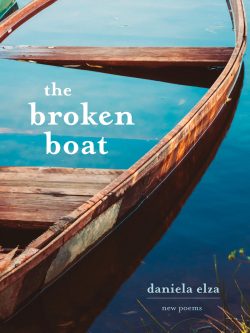#881 A gentle terrier of language
the broken boat: new poems
by daniela elza
Salt Spring Island: Mother Tongue Publishing, 2020
$19.95 / 9781896949796
Reviewed by Christopher Levenson
*
 Anyone who has endured the break-up of a marriage or indeed any close long-term relationship will be able to empathize with the settings and themes of these poems. Readers, who might shy away from a total poetic immersion in such matters, need have no fears. The poems in Daniela Elza’s latest volume are not confessional so much as analytic, drawing less on Plath than on the Atwood of Power Politics (1971), though with a milder use of irony.
Anyone who has endured the break-up of a marriage or indeed any close long-term relationship will be able to empathize with the settings and themes of these poems. Readers, who might shy away from a total poetic immersion in such matters, need have no fears. The poems in Daniela Elza’s latest volume are not confessional so much as analytic, drawing less on Plath than on the Atwood of Power Politics (1971), though with a milder use of irony.
Despite the absence of any neat narrative progression, or maybe precisely for that reason, we encounter a series of meditations and insights held together mainly by cadence and verse movement. Developing a style evident in her previous book, the weight of dew (Mother Tongue: 2012), she mostly uses a variant of William Carlos Williams’ triadic line. Thus “the difficulty of such beginnings” starts:
the bursting of a leaf from the Japanese maple
I thought dead. I thought
(with some relief) I will not have to
care for it anymore.
an absence I was beginning to accept
when the leaf surprises me.
a small fist
unfolding
announcing itself full of light.
tells me we are wrong. tells me
we are the names we give things.
Part of the power of good poetry is its ability to say simple, straightforward things memorably. In the passage above the spacing of the lines, along with the relative absence of punctuation, not only enables some nice ambiguities in the line breaks but also imposes a considered, meditative pace that underlines the mostly tentative, ruminative tone. All this in turn can lead to lines such as:
we are learning how to be strangers
now.
Similarly in the line, the rules are not what we are used to.
the space before the two final words allows for two separate statements: firstly that we are more than, or different from, our rules and secondly that we are not used to these rules. She follows this up in the next line with the apparently metaphorical assertion that:
we live on time capsules now.
that is, we live in a time warp or a collection of things representative of a particular era, only to make the idea of capsules literal in what immediately follows:
don’t
open. just swallow
with lots of water. pretend they are
sleeping pills
so that the separation of the word “pretend” makes it into a general injunction After the space this is narrowed down to the specific but without losing its broader overtone.

If the spacing of lines on a page is important as an aspect of verse movement, so too is the need for good poetry to condense as much meaning and suggestion as possible within the limits of a single phrase or sentence, a “value-added” element that is often achieved through word play, puns, and double entendre. Thus in the phrase “the scrubbing of plots and pans,” not only does “plots” replace pots but “scrubbing’s” colloquial meaning of abandoning plays into the overall emotional scenario. So too with the phrase “the heart running on empty.”
Elza proves to be a gentle terrier of language, worrying at and teasing out underlying meanings and suggesting emotional implications in words we had taken for granted so that in the end almost everything becomes analogy or metaphor. At times, however, she overreaches. While one can appreciate the section heading Eros/ions, which makes a real and interesting point, there are other instances, such as “fragile” or “I hate closing doors” that distract from, rather than reinforce, her meaning. Though in one sense clever, they fail to convince me at least of their poetic necessity and come across as willed, arbitrary.
Yet, part of the power of poetry is that it focuses language so that it can say simple, straightforward, true things memorably, and only two lines later she writes:
all night the wind ran its fingers through your
sorrow.
which is evocative, not just because of the image evoked but also in part to the suspense of the line break. Elza keeps on surprising the reader in this way.
Although there are indeed poems such as “what remains” (p. 89), where a whole episode from the poet’s childhood is evoked and consistently followed through to make a powerful symbol for her present situation, most of the book works more impressionistically. We retain images and individual lines rather than whole poems so that ultimately what holds these poems together is a common mood, an atmosphere, not limited to grief and loss, but also to every shade of bewilderment, regret, frustration, nostalgia and remembered tenderness. While the book’s impact might have been even greater had it been fifteen to twenty pages shorter, it is nonetheless an impressive achievement, an anthology of loss to which readers can return almost at random and be sure of finding poetic sustenance.
*

Born in London, England, in 1934, Christopher Levenson came to Canada 1968 and taught English, Creative Writing, and Comparative Literature at Carleton University from 1968 to 1999. He has also lived and worked in the Netherlands, Germany, Russia, and India. He has written twelve books of poetry, the most recent of which is A Tattered Coat Upon a Stick (Quattro Books, 2017). He co-founded Arc magazine in 1978, was its editor for the first ten years, and was for five years Series Editor of the Harbinger imprint of Carleton University Press, which published exclusively first books of poetry. He has reviewed widely, mostly poetry and South Asian literature in English, in the UK and Canada. With his wife, Oonagh Berry, Christopher moved to Vancouver in 2007 where he helped re-start and run the Dead Poets Reading Series. Editor’s note: among the books he has reviewed for The Ormsby Review are those by Sarah de Leeuw, Susan Buis, Miranda Pearson, E.D. Blodgett, Nicholas Bradley, David Zieroth, and Kate Braid.
*
The Ormsby Review. More Books. More Reviews. More Often.
Publisher and Editor: Richard Mackie
The Ormsby Review is a journal service for in-depth coverage of B.C. books and authors. The Advisory Board consists of Jean Barman, Robin Fisher, Cole Harris, Wade Davis, Hugh Johnston, Patricia Roy, David Stouck, and Graeme Wynn. Scholarly Patron: SFU Graduate Liberal Studies. Honorary Patron: Yosef Wosk. Provincial Government Patron since September 2018: Creative BC
“Only connect.” – E.M. Forster
3 comments on “#881 A gentle terrier of language”